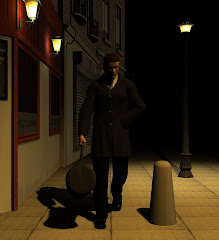
Can you be a great artist without leading a classic artist's life? Edward Hopper thought so. He had perhaps the least eventful existence of any successful painter. It was entirely spent in the same city, New York, and mostly even in the same studio. He started as a commercial artist and made the transition to an independent one with absurd tranquillity. He married his wife Jo in 1924 and saw no reason not to stay married to her until his death forty three years later. There was no apparent turmoil, no flamboyance and no self-destruction.
Of course you don't need any of that if you're brilliant – which Hopper certainly was. Its absence, though, might influence the sort of art you create. Hopper became known as a 'neo-realist.' His scenes, apparently only one stage away from photography, are of mundane little nooks and corners, the unremarkable sidestreets of the modern world. A better word for him is actually a 'hyper-realist;. There is nothing dramatic or beautiful to distract us from his visions of normality. We are forced to focus on the real world as it is – and see the truths he has subtly placed inside.
Nighthawks is effectively a picture of two halves. The left hand side gives a classic Hopper image. Though he painted some pastorals too, he tended to focus on towns or cities. And they are urban landscapes from which all trace of nature has been removed. Take
The City, where the flat tops of the buildings compose a new form of terrain which stretches to the horizon. His cityscapes lack something else too. Namely people, the things for which they were supposedly created. The shops in
Drug Store and
Early Sunday Morning apparently serve nobody and are served by nobody. They have no function. Likewise the dark street in
Nighthawks. It could have been made picturesque or menacing. But it is simply empty in every sense, a place without a soul, and so becomes almost pitiful.
The other half of the painting is dominated by the harsh glare of the coffee house. Hopper could do light and shade better than anyone since Caravaggio. He used them quite differently, however. Caravaggio was theatrical, his striking beams of light piercing thick pools of gloom and illuminating every wrinkle of his actors. Hopper's lights are generally weak little beacons standing alone. The lamps of the petrol station in Gas, struggling to keep at bay the threatening shadows of the night forest. And those of
Nighthawks' coffee shop, which is revealed to be almost as empty as the street outside. It is the epitome of bleakness. Blank walls, an unpainted door, the only adornments the two water heaters and a few scattered utensils. If we saw this place in real life, we would walk straight past. But now we are forced to stare inside.
Four figures are there, a surprisingly high number for Hopper. More typical is how he has placed them. None are looking at each other. Nobody ever does in his works, not even the young lovers on a
Summer Evening. One man is turned away, half his body and apparently all of his mood swallowed by gloom. The couple in the middle may be together but there is no connection between them. The woman examines her fingernails in a classic posture of boredom. She seems thoroughly uninterested in her partner, who in turn gazes out at us with disappointment on his sharp features. The only figure who is at all animated is the bartender, pausing in a task to stare out of the window. Follow his gaze, though, and you see he is looking at nothing at all – just the empty street.
This purposelessness is everywhere in the scene. These are not nighthawks engaged in illegal pleasures or depraved hedonism. They sit in this drab little room because they have nowhere else to go. They are alienated even from each other; their loneliness emphasised cruelly by the line of empty bar stools in the foreground. Each one, you feel, comes here every night to sit in silence. And when the place closes they walk home alone through the empty streets.
What can you do if you're an artist who has never experienced true tragedy? You can try to do this if you choose. Create horribly believable visions of explicable, everyday misery.

